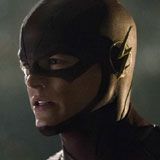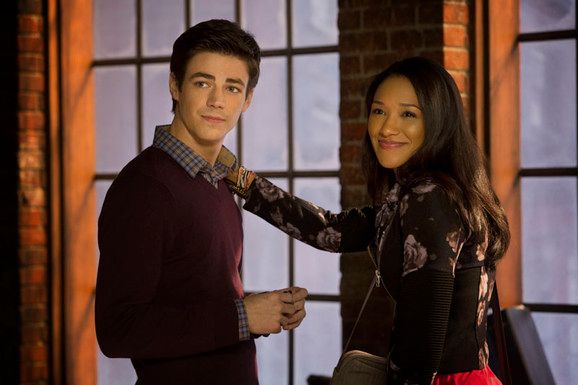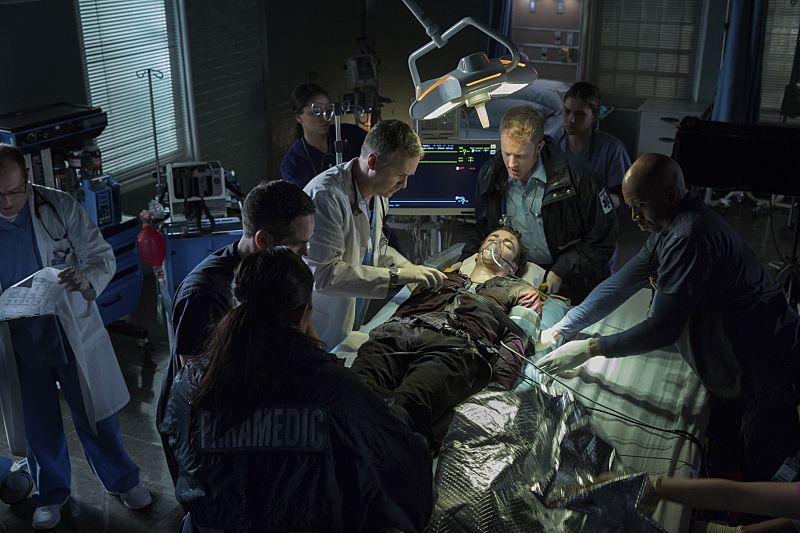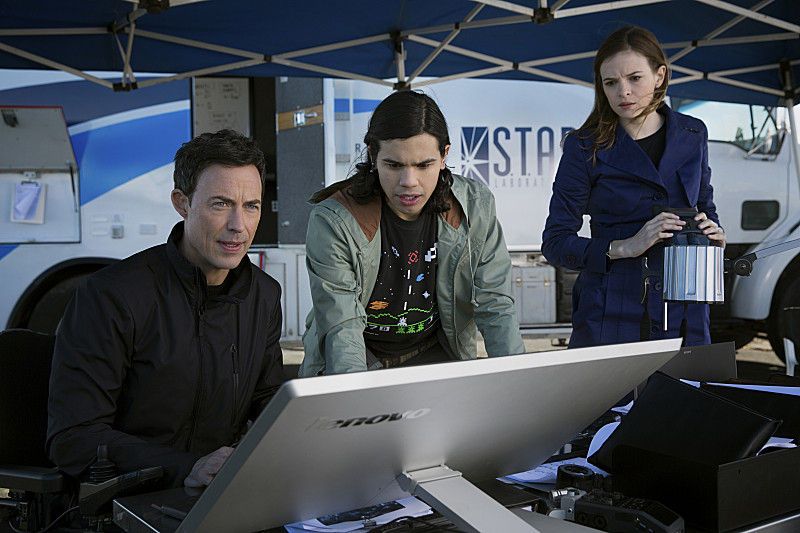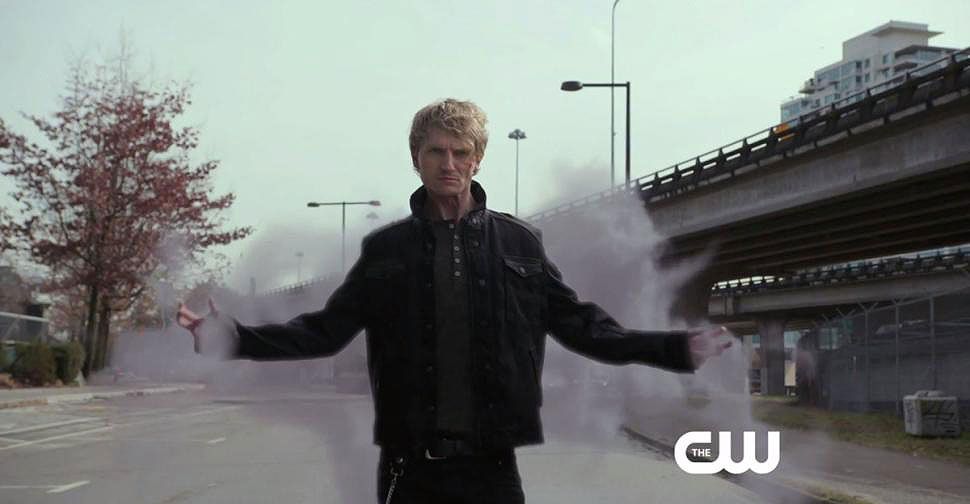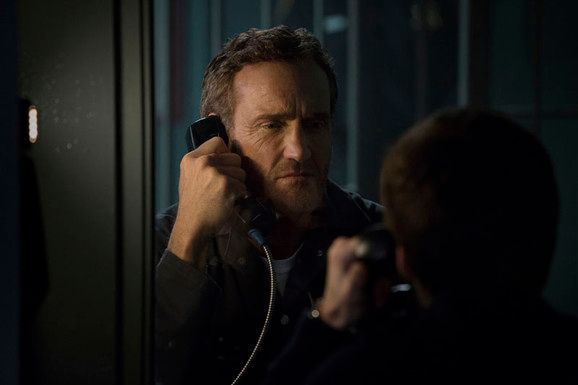DC Comics’ takeover of television continued Tuesday with The Flash, which showrunners Greg Berlanti and Andrew Kreisberg have promised will be purest superhero show. While suffering from a bit of pilot-itis, the first episode of the CW’s Arrow spinoff certainly lives up to that promise as The Flash appears to be an unapologetically hopeful superhero adventure, one that’s sure to delight hard-core and casual fans alike.
After the “no tights, no flights” rule of Smallville and “no powers” rule on Arrow, it’s refreshing to see a superhero series fully embrace the genre. This episode is penned by two names familiar to fans of DC Comics, Andrew Kreisberg and Geoff Johns; the latter’s run on The Flash comic still resonates years later.
Shall we begin?
The episode opens with a Sam Raimi Spider-Man-like voiceover juxtaposed with a visual of a familiar red streak. The first time viewers see the Flash (Grant Gustin) is in full daylight, and with an instant feeling of freedom and joy. It’s not quite the unadulterated tone of delight one feels when first watching Dash in The Incredibles, but the warmth is there. A viewer will get a Spider-Man vibe from the pilot, as the Flash and his world are established through a series of triumphs and tragedies, with a hero who’s hopeful and kind enough to endure it all.
After we hear from Barry, the show quickly establishes his primary motivations, the murder of his mother Nora Allen (Michelle Harrison) and the framing of Barry’s dad Henry (John Wesley Shipp), a tragedy that set Barry’s path as a police scientist (Barry wears red in the flashback, a nice touch). The scene establishes the strong relationship with his mother, and also succeeds in making Barry’s parents concrete figures.
In the present, we see Barry investigate a crime scene, with the series aping Sherlock in visualizing his rapid processing of clues -- but works to quickly establish his analytical mind.
A lot of exposition follows in order to establish the fateful particle accelerator that will give Barry his powers and to explain his relationship with Iris West (Candice Patton). This is where the show get the clunkiest, as everything is told rather than shown. How do we know Barry and Iris are best friends? Because Barry says, “You’re my best friend, Iris.” Couldn’t this have been established by a young Iris comforting Barry after his mother’s murder? We’ll chalk this up to having to force what could’ve been a two-hour pilot into 44 minutes. Still, there were more skillful ways to accomplish this.
(As an aside: Grant Gustin would’ve made an amazing Peter Parker; he has that boyish vulnerability but intense presence that made Tobey McGuire so great.)
The introductions don’t end with Iris, as we also meet Eddie Thawne (Rick Cosnett), who’s able to catch a crook who stole Iris’ bag when Barry couldn’t. That probably won’t be the last time Barry and Eddie compete. All that is established for Thawne so far is that he’s handsome, confidant and the darling cop of Central City. The parallels to Johns’ Hunter Zolomon character are there, as seasoned Flash fans know where this could be going.
The series deftly adds longtime Wally West love interest Linda Park to the mix as a TV reporter covering the fateful particle-accelerator accident that will create the Flash right before the pilot replays the origin-forging lightning strike from Arrow, interspersed with the origin of Weather Wizard as a pair of bank-robbing brothers make a daring escape in a small aircraft. The plane is hit by the accelerator’s particle wave and a villain is born alongside a hero.
This is where we left Barry in Arrow, but now we get to see what comes after. Barry awakens after a nine-month coma in what remains of STAR Labs, where he’s greeted by a surprised Cisco Ramon (Carlos Valdes) and Caitlin Snow (Danielle Panabaker) -- the comic-book alter egos Vibe and Killer Frost -- and a lot more exposition. I’ll say it again: This episode needed to be two hours, as information about Snow and Ramon and Barry’s accident is unceremoniously dumped on the viewer. Some good comedic moments follow as Barry notices his abs for the first time. The wheelchair-bound Harrison Wells (Tom Cavanagh) is also brought in to explain science-y stuff. It seems his experiments and the accelerator accident caused many people around Central City to develop super-powers. As far as the series goes moving forward, it seems Harrison’s experiments could’ve fueled an entire rogues gallery. As a story engine goes, I’ve seen worse.
We’re introduced to the first of the Rogues during a bank robbery -- a little cliché, but with a Silver Age appropriateness that showcases Weather Wizard (Chad Rook) in his terrible glory. The TV series gives the villain a more dangerous presence than the comics ever did.
While the Weather Wizard strikes, we’re treated to a great grouping of scenes as Barry’s powers begin to manifest as he races to tell Iris he’s alive and well. He immediately, and gleefully, embraces his newfound abilities: There may be an undertone of tragedy to Barry’s past, but he isn’t bogged down in melancholy like so many heroes. That element of joy makes this superhero series stand out from the ever-growing pack.
The episode instantly jumps to Barry testing his powers under the watchful eyes of Cisco, Caitlin and Harrison. More exposition follows as Caitlin explains how the explosion killed her fiancé and caused her to become embittered with life, an element to her character that DC loyalists might find chilling. The depictions of Barry’s powers look amazing and cinematic, and probably are encapsulating moments that fans of the character have waited their entire lives to witness in such grand fashion. The sequences are playful but not at all campy, as they’re interspersed with visions of Nora Allen’s death, a constant reminder of Barry’s mission.
It seems as if the series is going to lean heavily on its procedural elements at times, as Thawne and Detective Joe West (Jesse L. Martin) attempt to solve a string of bank robberies. The cop stuff should keep the series fresh, allowing the producers to bounce from STAR Labs to the Central City precinct, two settings populated with viable supporting characters.
From there, we see Gustin at his best as he nails a scene in which he recounts his family tragedy to Cisco, Caitlin and Harrison. And we get to glimpse the Reverse Flash in flashback, giving fans a compelling hint at what’s to come. Looks like the series will feature soldier villains like Weather Wizard and master villains like Reverse Flash -- and, hey, what was that smashed-up cage at STAR Labs marked “Grodd”? Please join me as I do a little happy dance.
The hero action is interrupted a bit for some soap-opera elements as Iris is revealed to have begun dating Thawne during Barry’s coma, making the possible-future Reverse Flash into the Harry Osborn of the series. I guess they have to start the fateful Thawne/Allen rivalry somewhere.
The soap-opera stuff is quickly interrupted with the first Flash/Rogue confrontation: In broad daylight, we’re treated to a superhero/villain fight, something we’ve never really seen on superhero TV. The pilot isn’t all origin, as it quickly morphs into a Flash adventure. The show demonstrates it isn’t ashamed of its source material, as even the most outrageous plot elements are embraced. A weather-controlling villain could quickly stumble into the realm of silliness, but here it doesn’t.
All the more fantastic elements are weighed against the idea that Barry’s great conflict is that he knows his father is innocent, a truth he must chase; it’s something that gives his character depth but doesn’t burden him with hopelessness. Instead of giving in to the tragedy, Barry chooses to fight to prevent others from happening.
Through Weather Wizard, we’re introduced to the concept of “metahumans”: The Flash’s will superhumans originate from the same source, the particle-accelerator accident, which explains why the supervllains will be confined to Central City. For now. Through Harrison, the series sets up an infinite number of villains. It might have a freak-of-the-week flavor, but The Flash justifies its freaks.
Barry doesn’t allow his past tragedies overwhelm his spirit, but Harrison does, and doubts Barry’s resolve. The brilliant but beleaguered scientist doesn’t believe Barry could be a hero. So Barry seeks out the only hero he knows. What follows is a terrific meeting between Barry and Oliver Queen, who gives the fledgling crimefighter his mission and solidifies the friendship between a different version of the World’s Finest.
The pilot doesn’t skimp on the action toward the end, as Weather Wizard and Barry face off in a classic battle that sees the Flash racing around a tornado in an opposite direction in order to diffuse the storm. It’s a showdown ripped from a Silver Age comic cover; one can imagine Gardner Fox and Carmine Infantino somewhere smiling.
The sequence resonates, as Harrison, who previously cautioned Barry against playing hero, now yells through the earpiece of the Fastest Man Alive, “Run, Barry, run!” Any Flash fan should’ve gotten gooseflesh. The Flash does his part, unraveling the tornado headed toward Central City, leaving Weather Wizard exposed, and open to gunfire from Detective West … who sees it’s Barry beneath the red mask. Now all the supporting characters know except for Iris, putting her in the Gwen Stacy roll -- complete with the fatherly promise that Barry must never tell her his super-secret. While Arrow cribs liberally from Batman, it looks as if The Flash could find some of its structure in Spider-Man.
The pilot closes with Barry visiting his father in prison, a scene that showcases two actors who’ve played The Flash on television (Shipp starred in CBS’s short-lived 1990 series). Their exchange drives home the idea that Barry has been running his entire life – but now, with his powers, he’s moving toward something. In doing so, he’ll be a symbol of hope and goodness, a being we haven’t seen much, a hero who unapologetically dwells in the light.
Ladies and gentlemen, The Flash.
The epilogue should blow the minds of DC fans: Harrison enters a hidden room in STAR Labs, rises from his wheelchair and looks at a display featuring the front page of a newspaper with a headline emblazoned with the word “Crisis.” Let’s leave it there and say, if you love the Flash, Silver Age, modern or both, you will love this series. It may have suffered from some clumsy exposition, but what pilot doesn’t? There’s a sense of wonder to this show that is absolutely refreshing.

